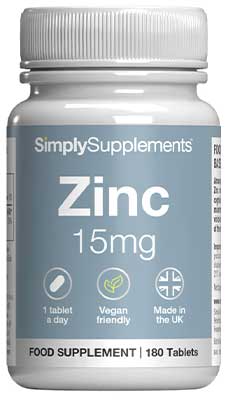What Are the Best Insomnia Supplements?

Sleep is hugely important to the human body. For many of us it’s too delicate a state to maintain or, more severely, eludes us altogether. Insomnia affects a huge number of people, for a variety of reasons, be it stress, persistent pain, preexisting conditions or a chemical imbalance in the brain.
Along with a healthy lifestyle, supplements can help you drift off peacefully at night. There’s a huge range that claim to help with sleep – we’ve made a list of some of the best supplements, along with the science behind their claim. While none of these are going to put you under like a tranquiliser, they can support a more natural sleep schedule and ease the mind into rest every night.
Valerian Root
Valeriana officinalis, more popularly known as valerian, is a herb that’s been used medicinally in Europe and North America for centuries. More recently, its root has been used in supplements as a very mild sedative, to assist with ailments such as restless leg syndrome, anxiety, menstrual issues and, most recognisably, insomnia.
There’s been a lot of research into valerian extract's sleep-enhancing abilities. One study that used its aqueous form found that it improved sleep quality in a range of people: those “who considered themselves poor or irregular sleepers, smokers, and people who thought they normally had long sleep latencies (length of time it takes to fall asleep).” Another study into aqueous valerian observed a “mild hypnotic effect” with a more subtle effect on participants: better sleep latency, better waking after sleep and less “night-time motor activity.”
Lavender
A classic go-to plant when it comes to sleep, lavender is indeed available as a supplement. Many cosmetics and soaps are scented with the purple flower specifically because of its antifungal and calming effects. In popular thinking, the scent of lavender is instinctively linked to calmness and sleep.
Scientifically, the link to lavender and sleep remains strong, too. Using the aroma of lavender oil in one study saw improvement in sleep in its participants, more so in those with “milder insomnia.” In those diagnosed with subsyndromal (mixed) anxiety disorder not only did lavender improve mental and physical health, but also resulted in greater quality and length of sleep. This study used lavender oil taken orally, which is one form in which the plant can be taken, along with capsules, via aromatherapy, oil or other methods. This is one area where research is lacking; what is the most effective way of absorbing lavender into the body?
Glycine
Less typically, the amino acid glycine is thought to have a positive impact on sleep. It’s usually absorbed from protein sources in the diet, but is also available in supplement form. It’s used all over the body, but what’s relevant to sleep is its effect on the brain. It’s involved with the transmission of chemicals across the brain; for this very reason it is being looked into for its effectiveness against schizophrenia. It’s believed that it can also induce calmness, helping people drift off to sleep and feel more awake in the morning. Does the research back up these claims?
Multiple research papers have suggested the benefits of taking a glycine supplement before going to bed. One study found it improved subjective and objective sleep quality and latency, with another study’s results stating that it helped fatigue, “liveliness and peppiness” and “clear headedness”. A lot of the evidence, as you can see, comes from observations made by the participants themselves. One 2012 study measured melatonin levels and the circadian rhythm (the “body clock” that influences sleep) in participants taking glycine in “partially sleep-restricted” conditions. Glycine didn’t directly affect circadian rhythm, simply modulating it without a large chemical change. Moreover, participants’ sleepiness and fatigue induced by the sleep restriction was improved.
Melatonin
The “sleep hormone” in the body, it makes sense that many turn to melatonin to assist with falling asleep. More precisely, levels rise in the evening and lower in the morning (coinciding with healthy sleep schedules) and is affected by any light you may see. With a massive effect on the body’s circadian rhythm, it’s one of the first supplements those with disrupted sleep turn to.
This body clock-altering ability makes melatonin a popular supplement for travelers who suffer badly from jet lag. This points to one of its unique properties; timing is important when taking it, requiring absorption of the melatonin before sleeping for it to be most effective. Research has shown that night shift workers have different melatonin levels compared to the norm, making them susceptible to fatigue and shorter sleep.
In terms of the supplement assisting with sleep, plenty of research has found that it can with the amount and quality of sleep, as long with sleep latency (one study states that participants fell asleep an average of 7 minutes faster when taking melatonin).
A meta-analysis of the effects of melatonin also found that participants didn’t build up a resistance to the supplement after repeated use, which can happen with other hypnotics (higher strength drugs that assist with sleep).
Note that unlike many of the other supplements discussed here, melatonin is currently a restricted substance in the UK, so can only be legally obtained from a healthcare professional.
Zinc
This element is used all over the human body, with applications against a huge amount of conditions, both proven or currently being researched: osteoporosis, ulcers, food poisoning, depression, anorexia, the common cold and many, many more. It’s an important trace element to maintain in both children and adults, with zinc deficiency being common around the world. So how can it help with getting a good night’s rest?
A Korean study into sleep measured the amount of zinc and copper in the hair of 126 adult women (mineral deposits can be easily tracked, as the hair absorbs minerals from the blood over time).
Women in the upper third of zinc and copper levels had the highest percentage of participants with “optimum sleep duration.” Other pieces of research that have looked at zinc alongside other minerals or supplements have further confirmed these findings. That said, the link between zinc and sleep is there, it just needs examining further to find out the most effective supplementation to help individuals drop off.
Magnesium
Another element, magnesium is involved with a staggering amount of reactions all over the body, in the muscles, bones, heart, brain and in individual cells. It’s important, then, that levels are high in the body for more reason than simply just sleep. Naturally, magnesium can help with relaxation, both in the brain and the rest of the body, which leads to its ability to help with sleep.
There’s been research into the effects of magnesium deficiency on sleep, but few pieces on how magnesium supplements can enhance sleep. One piece of research states that insomnia might arise from not having enough magnesium in the body, and it reinforces its importance in nerve and brain cell function. Another study from 1993 found that sleep was “disorganized” during a state of magnesium deficiency, resulting in lighter sleep and increased wakefulness.
One piece on the effect of magnesium supplements looked on the effect of the element on 46 elderly participants, suffering from insomnia. It was discovered that, after eight weeks of daily 500mg supplements, there was a benefit in almost every area of sleep, including the concentration of melatonin in the brain.
With some statistic saying that up to 70% of the UK has a magnesium deficiency, it’s not only good for sleep to keep your levels high, but for your overall health. Look out for symptoms such as mood swings, eye and muscle twitches, headaches, heart palpitations and, of course, difficulty sleeping.
Conclusion
These supplements are a mix of substances that are either outside forces, such as lavender and valerian, or those which are required in the body to aid sleep, like zinc and melatonin. Along with assisting sleep, the latter of the two types can also fortify other parts of the body, making them an attractive choice for all-round health improvement (especially so with how prevalent magnesium deficiency is).
With sleep being a delicate state for some, using these supplements requires patience and perseverance. Try to integrate them into your pre-bed routine for the best chance at a sound night’s sleep.
Sources:
https://www.sleepcouncil.org.uk/wp-content/uploads/2013/02/The-Great-British-Bedtime-Report.pdf
https://www.webmd.com/vitamins/ai/ingredientmono-870/valerian
https://www.healthline.com/nutrition/valerian-root#section1
https://www.ncbi.nlm.nih.gov/pmc/articles/PMC4394901/
https://www.ncbi.nlm.nih.gov/pubmed/19014069
https://www.webmd.com/vitamins/ai/ingredientmono-1072/glycine
https://www.ncbi.nlm.nih.gov/pmc/articles/PMC3328957/
https://www.webmd.com/vitamins-and-supplements/glycine-uses-and-risks#1
https://onlinelibrary.wiley.com/doi/full/10.1111/j.1479-8425.2007.00262.x
https://link.springer.com/article/10.1111/j.1479-8425.2006.00193.x
https://www.healthline.com/nutrition/magnesium-and-sleep#section1
https://www.ncbi.nlm.nih.gov/pubmed/23969766
https://www.ncbi.nlm.nih.gov/pmc/articles/PMC3703169/
https://www.karger.com/Article/Abstract/118988
https://www.webmd.com/vitamins/ai/ingredientmono-982/zinc
https://www.ncbi.nlm.nih.gov/pmc/articles/PMC5713303/
https://www.mdpi.com/2072-6643/7/7/5247
https://www.ncbi.nlm.nih.gov/pubmed/22476977/
https://www.sleepfoundation.org/sleep-topics/melatonin-and-sleep
https://www.webmd.com/vitamins/ai/ingredientmono-940/melatonin
https://www.ncbi.nlm.nih.gov/pmc/articles/PMC3656905/
https://journals.lww.com/joem/Abstract/2005/09000/Melatonin,_Sleep,_and_Shift_Work_Adaptation.4.aspx
https://www.ncbi.nlm.nih.gov/pmc/articles/PMC43256/
https://www.webmd.com/vitamins/ai/ingredientmono-838/lavender

 Richard
Richard 

























